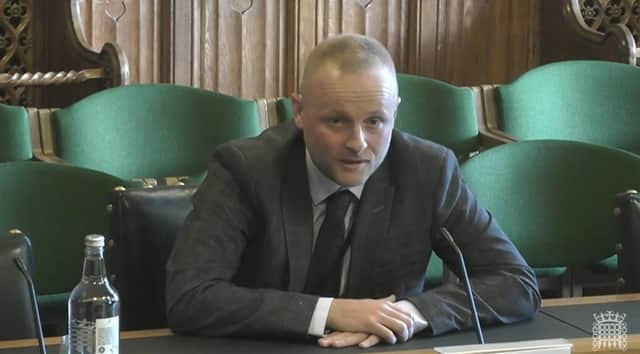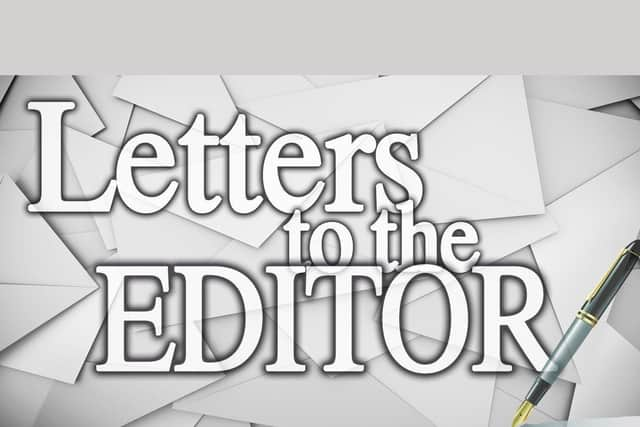Jamie Bryson: Any unionist who returns to Stormont with the Protocol Framework in place will be implementing the subjugation of the Union


Framework will require a restoredStormont to subjugate the Union
On Tuesday before the Northern Ireland Affairs Committee in Westminster I found myself in a robust debate with Sir Robert Buckland KC, former Justice Secretary and Lord Chancellor.
Advertisement
Hide AdAdvertisement
Hide Ad

It lasted for around 12 minutes, and I would encourage persons to watch the entire debate, rather than twitterati deceptively edited clips. In challenging me on the damage inflicted upon the Acts of Union, the thrust of his point (at least initially) that there was nothing to see here, that this was simply a normal exercise of Parliamentary sovereignty.
This appeared, to me anyway, to be rather understating the matter.
Sir Robert described Parliamentary supremacy (in the context of Parliament’s Withdrawal Act subjugating Article 6 of the Acts of Union) as “completely unremarkable”.
It was upon this premise rested his argument that constitutionally, the subjugation of the foundational constitutional statute was entirely normal and ought not to be a matter for concern. This seemed to confuse what Parliament could do, and the constitutional consequences of doing such a thing.
Advertisement
Hide AdAdvertisement
Hide AdFor example, a joiner using a hammer to hit a nail is entirely unremarkable, however if the nail is hammered into someone’s hand, it would seem rather irrelevant (and in fact rather absurd) to say that its unremarkable that a joiner would hit a nail with a hammer.
And thus, Sir Robert got himself to the point whereby his argument stood on the basis that the action of Parliament doing anything is, legally, unremarkable.
Respectfully Sir Robert appeared to head down this slippery slope without much appreciation for the unsustainable position in which he would eventually find himself, namely having to accept (or at least being unable to answer) the point that if his premise was correct, then Parliament abolishing itself and ushering in dictatorship would be entirely “unremarkable” and “legal”, and – based on his premise – constitutional.
The former Lord Chancellor seemingly failed to grapple with the point that just because Parliament, in exercise of a maximalist (and seemingly unconstrained) interpretation of sovereignty can do ‘something’, that this doesn’t mean that the ‘something’ was constitutional or “unremarkable”.
Advertisement
Hide AdAdvertisement
Hide AdThis point was made good by the propositions around Parliament abolishing judicial review or even itself.
There is a difference between something being ‘legal’ (ie, Parliament may do it) and something being constitutional. I put my case firmly on the basis that there has been a fundamental constitutional change to Northern Ireland’s place in the Union: that is evident from reading the trilogy of judgments in the Allister protocol cases.
That Parliament, apparently, intended to bring about this constitutional change says nothing about whether such an action is constitutional, let alone compatible with the fundamental promises made to the unionist/loyalist community in the Belfast Agreement.
Sir Robert further took exception to the use of the term “subjugation”.
Advertisement
Hide AdAdvertisement
Hide AdThis I found rather odd, given it was the government itself (of which he was part during the Allister litigation) who had made that argument. In any event, Sir Robert then – once this inconvenient truth was highlighted, pivoted to saying that the “political” use of this term was somehow inappropriate.
But this point is unsustainable. The courts have said nothing about how a citizen ought to feel about the subjugation of the Acts of Union; they have merely said – as a matter of law – that the relevant subjugation has occurred. Subjugation means what it means, and the effect it unmistakable.
It seems in trying to enforce a benign interpretation that it is Sir Robert who is trying to politicise the term, for the benefit of those who wish to conceal the true impact of that which has been inflicted upon Northern Ireland.
In a final throw of the dice, Sir Robert angrily dismissed my suggestion the Supreme Court had found Article 6 was subjugated. He chastised me that if I wanted to quoted the UKSC, I should “get it right”.
Advertisement
Hide AdAdvertisement
Hide AdThis appears to be an unfortunate error by the esteemed senior counsel: paragraph 68 of the Supreme Court judgment in Allister explains the nature and extent of the very subjugation we are urged to pretend – for political convenience – doesn’t exist.
It is worth, again, pointing out the legal reality (it is up for each person to decide how they feel about that): The Act of Union is the Union, as stated by Lord Trimble. The Act of Union has been “subjugated”.
Anyone who enters the power sharing institutions is required, as a matter of law, to implement this subjugation. Therefore, any unionist who returns to Stormont, with the Protocol Framework in place, will be implementing the subjugation of the Union.
There may of course be different interpretations as to the constitutional consequences of that, and/or whether that is consistent with one claiming to be a unionist, but that it is the legal reality is surely beyond any dispute.
NI Director of Policy, Centre for the Union, Donaghadee